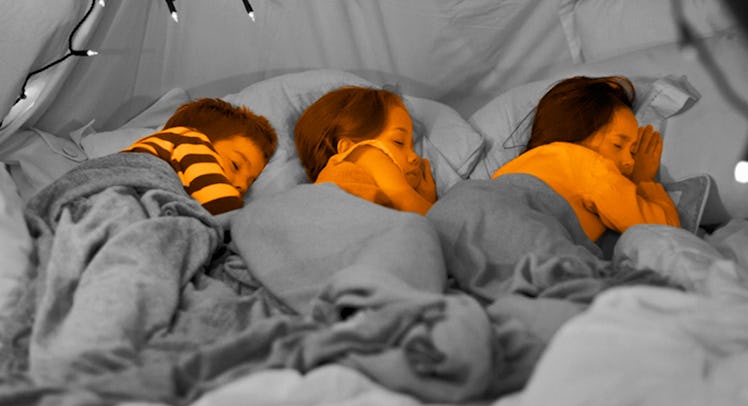How to Prepare a Kid for Their First Sleepover
Kids who've never stayed outside of their home may have anxiety. The parent's best tool for addressing those concerns may include a dry run with a relative.

Prepping a child for their first sleepover requires packing, providing emergency contacts, and addressing safety concerns, which often means having a frank and open conversation with your kid’s friend’s parents, who you likely don’t know that well. It’s a disconcerting process for a parent and an unnerving one for a kid. For the kid, though, the prospect of being away from home in the dark can — and not infrequently does — cause anxiety. Parents should know their children’s fears and worries, and be prepared to address them in advance. They should also be prepared to hide their own.
It is also important that parents be reasonable. The first sleepover is not an important milestone. If a child is already having trouble getting through the night at home, it might be a good idea for parents to skip the sleepover or organize a home game before asking the kid to hit the road.
“If they’re having nightmares or bedwetting or they end up in your bed at 2 a.m., don’t expect them to get through the night at the other kid’s house,” says Dr. Michele Borba author of Unselfie: Why Empathetic Kids Succeed in Our All-About-Me World. “You want to create safety and fun using the baby-step model. Can he get through the night at Grandma’s, or your best friend’s house? Try a dry run.”
Essentially, practice makes perfect. If a child hasn’t been to the friend’s house, parents should set up a daytime playdate first. If a child has never slept over at somebody else’s house, a faux sleepover in another room of their own house will help them figure out how to sleep in less-familiar settings.
How to Prepare a Kid for Their First Sleepover
- Try a dry run by seeing if they can sleep at a close relative’s house for a night.
- Understand their anxieties and try to address them before the sleepover.
- Remind children to be respectful of the other families cultural traditions and values.
- Know the home your child is visiting and introduce yourself to the parents.
- At drop off, tour the house with your kid.
- Give them an out if they want to bail on the sleepover before morning.
Sending a child to a sleepover also means exposing them to another family’s values, which opens up a conversation about the importance of following the rules set forth by other parents. For example, many children are exposed to different religious, like prayer before meals, for the first time as a guest at their house. Parents in these circumstances need to teach a child to be respectful, even if the child is not participating.
“When your child goes to somebody else’s house, it’s a great way to teach the child how to be a good guest,” says Borba, adding that parents should talk to the hosts to make sure they’re aware of the child’s own rules … especially when it comes to limitations on media like TV and video games. “Find out what the most important things that apply to your values and standards. That other parent is responsible not only for your child’s safety but your values.”
Familiarization with the families, Borba emphasizes, helps the child feel more comfortable, and can ease a parent’s mind during that first potentially stressful night. But what will best ease the kid’s mind is familiarization with the home they’ll be staying in.
If a child’s worried about finding the bathroom in the dark, the parent and child can arrive a little early, guide the kid from bedroom to bath, and plant a flashlight somewhere for good measure. If a child’s worried he or she won’t like the food offered, a pre-party dinner can solve that issue, and a bag of snacks can get them through the night (and help them win over other kids if there’s enough in their secret stash to share).
Age-appropriate comfort items like security blankets and stuffies can be sent in the child’s bag. And failsafe check-ins via phone can come with the built-in understanding that the kid can abort sleepover and get picked up at any point.
And if they do, approach them with empathy. It’s totally okay for them to bail on a sleepover. With more practice, they’ll figure it out eventually.